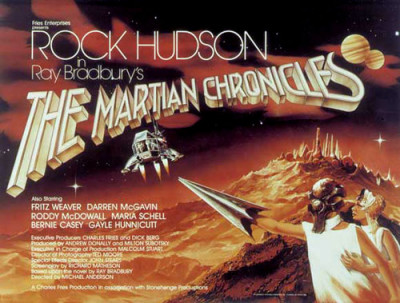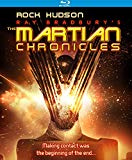| Reviews & Columns |
|
Reviews DVD TV on DVD Blu-ray 4K UHD International DVDs In Theaters Reviews by Studio Video Games Features Collector Series DVDs Easter Egg Database Interviews DVD Talk Radio Feature Articles Columns Anime Talk DVD Savant Horror DVDs The M.O.D. Squad Art House HD Talk Silent DVD
|
DVD Talk Forum |
|
|
| Resources |
|
DVD Price Search Customer Service #'s RCE Info Links |
|
Columns
|
|
|
Martian Chronicles, The
Worst of all, it was boring, so boring in fact that Bradbury himself declared it so publicly, at a press conference, essentially dooming the production before it had even aired, and compelling NBC to reschedule it from a planned high-profile September 1979 premiere to January 1980, effectively burying it.
All these years later, The Martian Chronicles is still pretty weak. On Blu-ray those lousy special effects look both worse and better, but overall the show has some good points.
Bradbury's 1950 book was not a novel, but rather a short story "fixup," a collection of previously published short pieces, some revised, some new with additional linking material. As Bradbury called it, a "half-cousin to a novel." The structure of the book, with loosely connected stories of varying length, was inspired by Sherwood Anderson's Winesburg, Ohio particularly.
The miniseries mostly adapts material from the book, but unimaginatively so. In "The Expeditions," the first of three 98-minute episodes, Col. John Wilder (Rock Hudson) oversees the first manned spaceflights to Mars. (Following the book while ignoring the scientific realities, Mars is depicted as having a thin but breathable atmosphere.)
The first mission, in January 1999, is thwarted when a telepathic Martian woman, Ylla (Maggie Wright), senses their impending arrival, and her intelligent but jealous husband (James Faulkner) kills them. The second mission, similar to Charles Beaumont's short story and Twilight Zone episode "Elegy," has three astronauts (including Nicholas Hammond, TV's Spider-Man) arriving to find Mars just like the American Midwest, populated by long-dead loved ones, in fact Martians in disguise. By the time the Wilder leads the third mission in 2001, the Martian population has been decimated, wiped out by chicken pox brought to Mars by astronauts aboard the first two missions.
In "The Settlers," set in 2004, Mars has been colonized with a dozen communities, including Wilder's family. This episode interweaves two stories at once. In the first, German settlers Anna and Leif Lustig (Maria Schell and Wolfgang Reichmann) are surprised when their long-presumed dead son, David (Michael Anderson, Jr.), of the failed second mission, inexplicably turns up alive at their remote seaside home. Leif quickly realizes that David is actually a Martian but goes along with the ruse because of the (delusional) joy it brings his grief-stricken wife. Elsewhere, missionaries Father Peregrine (Fritz Weaver) and Father Stone (Roddy McDowall) arrive, the former obsessed with making contact with intelligent, firefly-like lights in the desert sky. In the last act of the episode Sam Parkhill (Darren McGavin), an astronaut from the third mission, and his wife (Joyce Van Patten) open a ‘50s-style diner out in the desert where a major highway is planned, only to have their hopes dashed when the colonists are advised to return to earth and, soon after, World War III breaks out and the earth is destroyed in a nuclear war.
In the final segment, "The Martians," few humans remain on Mars. Benjamin Driscoll (Christopher Connelly) was in the mountains and unaware of the evacuation and, nearly dying of loneliness, is delighted to locate another survivor, Genevieve (Bernadette Peters), 1,500 miles away in another settlement. After flying there by mini-helicopter (similar to the one seen in You Only Live Twice) he's disappointed to find the sexy woman completely self-absorbed and only interested in using him to cook for her and fix things. Elsewhere on the planet, isolated scientist Peter Hathaway (Barry Morse) lives with his wife (Nyree Dawn Porter) and their 14-year-old daughter when discovered by Wilder and Father Stone, except it's obvious to them that the two women are actually Martians.
Decades ago from a library I checked out an unabridged audio book of The Martian Chronicles, read by Ray Bradbury. Though obviously not a polished, professional actor Bradbury's passionate reading of his own book was indescribably captivating. Like the golden age of radio, the listener creates in his mind the images Bradbury describes, which in the book has an ethereal quality almost completely absent here. The miniseries tries to be science fiction but the book is the purest form of fantasy, Bradbury likening it to modern-day Greek mythology.
The series, however, is thuddingly literal. Writer Matheson and director Michael Anderson Sr. seem to be aiming for some sort of compromise, with parts of some of the stories taking on a slightly surreal, ambiguous approach, particularly everything involving the Martians, but instead of an otherworldly quality these attempts only come off as draggy, with too much plainly shown. An ambiguity along the lines of Tarkovsky's Solaris (1972) is called for, but the execution is more like a cross between Space: 1999 and an American TV-movie of the week.
Much of the budget, probably less than $5 million, was expended on the full-size sets of the colonized Martian cities. Presumably production designer Assheton Gorton was thinking of practicality in having the cities appear fabricated out of lightweight aluminum, plastic and the like, all of it having been shipped from Earth, but visually it just looks cheap, with the settlement homes decorated with plastic lawn-type furnishings. The mission control back on earth is similarly uninspired and spartan.
The special effects, credited to John Stears, are mostly awful, with undetailed miniature spaceships obviously dangling from wires. A few scattered shots, like spacecraft descending into cloudy Martian atmosphere, are moderately effective, but most of it is patently phony.
A British-American co-production film in England and on location in the Canary Islands, The Martian Chronicles utilizes American name actors and, rather embarrassingly buried in the credits, British actors like Barry Morse, Jon Finch, Terence Longdon, Nyree Dawn Porter, along with expat talent based in the U.K. like Robert Beatty (as General Halstead).
One of the two main producers was London-based American Milton Subotsky, whose presence helps explain how The Martian Chronicles came about, and the way it did. Subotsky, with longtime business partner Max Rosenberg, had for years presided over Amicus Films, which specialized in horror movie anthology films, pictures composed of short segments, often adapted from EC horror comic book stories of the 1950s, using name actors that could be hired cheaply because of the short shooting schedules on each segment.
The Martian Chronicles does much the same, spreading out top-billed Rock Hudson's role over the three shows, the actor only appearing in a third or less of each segment. Though the credits bill all of the actors on each episode, most either appear in only one episode, or are featured in one and make a short appearance in another.
A few ideas from the book almost play well here, fleetingly effective though they may be. What's most memorable about the series is the idea of the few remaining Martian survivors basically haunting those from earth like ghosts, masquerading for their own survival as deceased loved ones among the settlers. In a nice touch, the Martians struggle to focus the illusion on a single family because in large crowds they have no control over this ability. Lost in the teleplay is any sort of depth to this strange symbiosis, of the Martians providing something the humans desire while the humans, knowingly or unknowingly, provide the Martians with the food and shelter they require.
The miniseries shows signs of having been meddled with from above (i.e., the network and/or its executive producers) and its already tight budget cut. After the nuclear war, Col. Wilder frantically flies a rocket ship back to earth to search for his brother and his family, but the sequence is so cheaply done and illogical one can't help but wonder if it was added at the last minute to give Rock Hudson more screentime. Little of it makes sense: he apparently flies to earth and back alone, unencumbered and unaided, then when he arrives at mission control there's no devastation and no radiation despite earlier footage of the earth burning into a cinder, and the electricity is still on. No bodies are seen, and in archived video footage Wilder watches as his brother and a few others simply disappear when the bombs fall; nothing else is damaged. If everything is peachy on earth save for the absence of people, why don't the surviving colonists return there, rather than struggle for survival on Mars?
The story, dramatized more or less as "straight sci-fi," begs many questions. Why do each of the survivors after the destruction of earth seem to believe they're the last ones left alive? Wouldn't those left alive need one another to survive? In one long scene Driscoll breaks into a house and begins dialing up everyone listed in the telephone directory, but each time he dials a screen instantly displays "no response" even though not even a few seconds have passed. How does the telephone know there's nobody at the other end to answer the phone? Why does all the electricity and everything else still work? What happens when they run out of food?
Video & Audio
The Blu-ray of The Martian Chronicles presents the series as it originally aired, in 4:3 standard screen format, and including the episode recaps and full opening and closing credits on each episode. The transfer is good, as is the DTS-HD 2.0 mono audio, which is supported by optional English subtitles. Region "A" encoded.
Extra Features
The lone supplement is a brief (about five minutes) interview with actor James Faulkner, the jealous Martian in the series. Given his small role, what he has to say is moderately interesting but unenlightening in terms of how The Martian Chronicles failed to live up to Bradbury's original book.
Parting Thoughts
Mediocre and frequently dull, testing the viewer's patience, The Martian Chronicles is still worth seeing once for its fleeting qualities and for its cast, and as a lesser example of long-form television. Rent It.
Stuart Galbraith IV is the Kyoto-based film historian largely absent from reviewing these days while he restores a 200-year-old Japanese farmhouse.
|
| Popular Reviews |
| Sponsored Links |
|
|
| Sponsored Links |
|
|
| Release List | Reviews | Shop | Newsletter | Forum | DVD Giveaways | Blu-Ray | Advertise |
|
Copyright 2024 DVDTalk.com All Rights Reserved. Legal Info, Privacy Policy, Terms of Use,
Manage Preferences,
Your Privacy Choices | |||||||
















